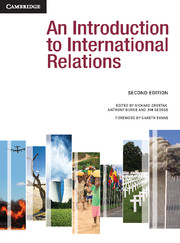Book contents
- Frontmatter
- Contents
- Tables, Figures and Boxes
- Contributors
- Preface and acknowledgements
- An Introduction to International Relations: The origins and changing agendas of a discipline
- 1 Theories of International Relations
- 2 The Traditional Agenda
- 9 The Modern State
- 10 Nations and Nationalism
- 11 Security
- 12 Arms Control
- 13 The Causes of War
- 14 The Changing Character of Warfare
- 15 The Ethics and Laws of War
- 16 International Law
- 17 International Society and European Expansion
- 18 Diplomacy
- 19 Great Powers
- 20 The Cold War
- 3 The New Agenda
- Glossary of Terms
- Bibliography
- Index
- References
9 - The Modern State
from 2 - The Traditional Agenda
- Frontmatter
- Contents
- Tables, Figures and Boxes
- Contributors
- Preface and acknowledgements
- An Introduction to International Relations: The origins and changing agendas of a discipline
- 1 Theories of International Relations
- 2 The Traditional Agenda
- 9 The Modern State
- 10 Nations and Nationalism
- 11 Security
- 12 Arms Control
- 13 The Causes of War
- 14 The Changing Character of Warfare
- 15 The Ethics and Laws of War
- 16 International Law
- 17 International Society and European Expansion
- 18 Diplomacy
- 19 Great Powers
- 20 The Cold War
- 3 The New Agenda
- Glossary of Terms
- Bibliography
- Index
- References
Summary
Introduction
This chapter introduces the principal actor in international relations: the sovereign state. It begins by defining the state. Second, it explores the origins of the state in the transition from the medieval to the modern world. Third, it examines the concept of sovereignty, especially as it was enunciated in early modern political thought. Fourth, it surveys different historical explanations of how the sovereign state triumphed over alternative forms of political society. Finally, it surveys some of the continuing debates about the morality and utility of the modern state.
What is a state?
The state may not be the only actor in world politics (see Chapter 22), but it is widely recognised as the one that has the greatest impact on people’s lives. It is, as John Dunn (2000: 66) says, ‘the principal institutional site of political experience’. This is why the title of J. D. B. Miller’s book, A world of states (1981), seems like such an apt description of international relations. But although we live in a world of states today, it was not always thus. At various moments in time, city-states, empires, feudal states, absolutist states or nation-states have been the dominant institutional form. So although humanity has always been divided into separate political societies, the character of these societies has varied historically and geographically. Sovereign states are distinctly modern inventions, and how long they will remain the principal institutional site of politics is a contentious issue, with some scholars suggesting that globalisation may be eclipsing the sovereign state (see Chapter 28). Whether or not they are declining in importance, moral doubts about the sovereign state continue to find expression. The state is, in many respects, a perpetually controversial subject precisely because it has been so central to domestic and international political life since the sixteenth century.
- Type
- Chapter
- Information
- An Introduction to International Relations , pp. 134 - 147Publisher: Cambridge University PressPrint publication year: 2011
References
- 1
- Cited by



